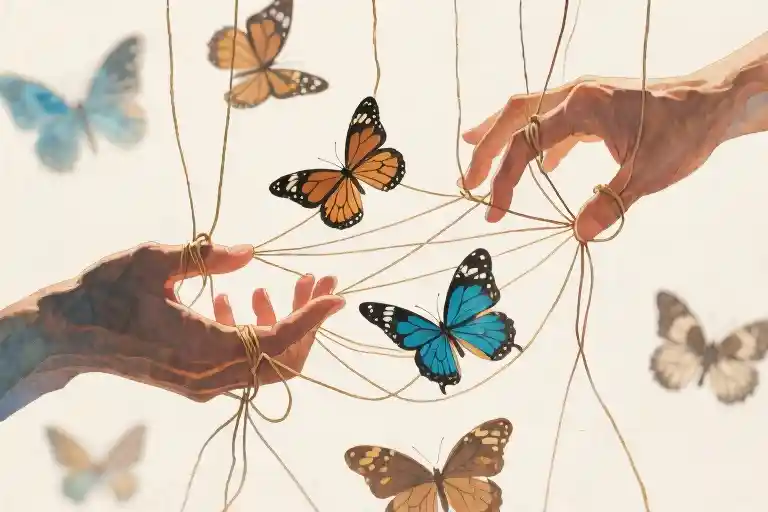Do marks, looks, status, or lifestyle matter?
We’ve all been taught the ideal answer – a resounding “NO.” True friendship should transcend superficial labels. But if we’re honest with ourselves, the real-world answer often stings: “YES.” And this uncomfortable truth reveals one of life’s most painful social dynamics.
Meet Shruti and Avriti – two classmates whose story exposes how conditional some friendships can be. When Shruti aced her exams, Avriti became her closest companion. They shared notes, inside jokes, and lunch breaks. But everything changed when Shruti’s grades slipped below Avriti’s. Slowly, the texts became shorter. The hangouts grew rare. Soon, Avriti was sitting with the new top scorer, leaving Shruti to eat alone.
What stung more than the distance were Avriti’s subtle put-downs. “You used to be so sharp,” she’d sigh during study sessions. “Maybe you’re just not cut out for this subject,” she’d offer with faux concern. Each backhanded comment chipped away at Shruti’s confidence until she started believing she truly was less capable.
This isn’t just about grades. We’ve all encountered versions of Avriti – friends who only stick around during our highlight reels but disappear during the bloopers. Maybe it wasn’t academic performance but weight gain, job changes, or relationship status that made their affection fluctuate. These conditional relationships force us to confront a harsh reality: some people don’t love us – they love what we represent.
The psychology behind this behavior stems from social comparison theory. People like Avriti use others as measuring sticks to validate their own worth. When we outperform them, they feel threatened. When we underperform, they gain a temporary ego boost. Either way, the friendship isn’t about mutual care – it’s about maintaining their fragile self-image.
Healthy friendships provide shelter during storms, not just sunshine. True friends celebrate your highs without jealousy and support your lows without judgment. They’re invested in your growth, not your ranking on some imaginary social ladder. As we’ll explore in later sections, learning to spot these toxic patterns early can save years of self-doubt and emotional whiplash.
For now, let this sink in: You are not your report card, your job title, or your Instagram likes. The right people will see beyond the labels to value the irreplaceable human beneath them. That’s the kind of friendship worth holding onto – and the kind we all deserve.
When Grades Become the Currency of Friendship: Shruti’s Story
Shruti never thought her 94% score in tenth-grade finals would become both a blessing and a curse. That glowing mark sheet first introduced her to Avriti during their junior college orientation, where the taller girl had approached her with notebook in hand. “You’re the topper from St. Xavier’s, right? Could you explain this calculus concept?” The question sparked three months of shared lunches, weekend study sessions, and inside jokes about their strict physics professor.
Their friendship followed an unspoken equation: Shruti provided academic insights while Avriti offered social protection. As the duo walked through campus, Avriti would casually mention, “This is my genius friend” to classmates, her arm draped around Shruti’s shoulders like a championship belt. The dynamic worked—until their first semester exams changed everything.
The Shift
When Shruti scored 68% in chemistry (blaming a family emergency during prep week), Avriti’s behavior transformed with chilling precision. The texts asking “What did you get?” stopped being celebratory comparisons and became forensic interrogations. Study invitations now excluded Shruti, with Avriti explaining, “The advanced group meets separately.” Worst were the public corrections—”Actually, the answer is…”—delivered with theatrical patience during class discussions.
Three specific incidents revealed the toxicity:
- The Library Snub: Avriti pretended not to see Shruti when sitting with new academic achievers
- The Backhanded Compliment: “You’re lucky you can afford to relax about grades” (implying laziness)
- The Confidence Undermining: “Maybe humanities would suit you better” before their science stream finals
The Emotional Toll
Shruti’s notebook margins filled with anxious scribbles: If I’m not smart, what am I? Her once-steady participation in class dwindled as Avriti’s voice took over discussions. The cruelest cut came when classmates started mirroring Avriti’s behavior—suddenly Shruti’s study group “didn’t have space,” and project partners became scarce.
This wasn’t just about grades. It was about conditional acceptance in its rawest form—the terrifying realization that some friendships come with invisible price tags. As Shruti told me later, “I didn’t lose a friend. I failed to maintain a transaction.”
The Wake-Up Call
The breaking point came during a cafeteria encounter where Avriti publicly critiqued Shruti’s career aspirations. “With your current marks,” she announced to the table, “that’s quite ambitious.” The silence that followed wasn’t judgmental—it was the collective discomfort of bystanders recognizing emotional bullying.
That moment sparked Shruti’s painful but crucial realization: toxic friendships often disguise themselves as ‘honesty.’ True friends challenge you to grow; toxic ones challenge your worthiness to try.
Next section preview: We’ll analyze why even smart people like Avriti engage in this behavior—and how to spot similar patterns in your relationships.
Why Do Friends Leave When You Fail?
We’ve all experienced that sinking feeling when someone we trusted starts pulling away during tough times. The psychology behind this phenomenon reveals uncomfortable truths about human nature and social dynamics.
The Comparison Trap: Why People Put Others Down
Social comparison theory explains much of this behavior. When Shruti’s grades dropped, Avriti didn’t just lose interest – she actively demoralized her. This reflects a psychological pattern where people maintain their self-esteem by:
- Measuring self-worth against others’ failures (“At least I’m doing better than Shruti”)
- Creating artificial hierarchies through put-downs
- Associating only with those who elevate their social status
Research shows this tendency peaks during competitive environments like schools or workplaces, where people unconsciously rank themselves against peers.
The Roots of Transactional Friendships
Friendships based on utility rather than genuine connection often crumble under pressure because:
- Security Seeking: Some people associate with high-performers to borrow confidence (Avriti initially clung to top-scoring Shruti)
- Social Mirroring: We often judge ourselves by how others see us – when you struggle, it forces them to confront their own vulnerabilities
- Status Anxiety: Being seen with “unsuccessful” people triggers fears of social demotion
Spotting Genuine Connection
Healthy friendships demonstrate these markers:
| Toxic Friendship | Healthy Friendship |
|---|---|
| Conditional on your success | Supports you through failures |
| Makes you feel inadequate | Builds your confidence |
| Disappears during tough times | Shows up when needed most |
The painful truth? Many relationships are transactions disguised as friendships. When you stop providing whatever benefit (grades, connections, reflected glory) the person wanted, they withdraw – exactly what happened with Avriti.
This isn’t about blaming individuals. Our competitive social systems reward this behavior. But understanding these mechanisms helps you:
- Recognize when someone’s distancing isn’t about you
- Invest energy in reciprocal relationships
- Avoid internalizing others’ insecurity-driven actions
Next time someone pulls away during your struggles, remember: their behavior says everything about their limitations, nothing about your worth.
5 Signs You’re Dealing with an “Avriti-Type” Friend (And How to Handle Them)
We’ve all encountered friendships that leave us feeling drained rather than uplifted. While the ideal answer to “Do marks, looks, status, or lifestyle matter in friendship?” should be “no,” real-life often gives us a harsh “yes.” These transactional relationships can be particularly damaging when we’re vulnerable. Here’s how to spot them before they erode your self-worth:
1. Conditional Availability
They only reach out when you’re doing well academically, professionally, or socially. Notice how they suddenly have time for coffee when you ace an exam but disappear during your struggles. This pattern reveals they value what you represent more than who you are.
How to respond:
- Observe their contact patterns over 2-3 months
- Politely note the discrepancy: “I’ve noticed we mostly talk when I have good news – is everything okay?”
2. Comparison as Competition
Every achievement of yours gets measured against theirs. If you share excitement about a 90% score, they’ll mention getting 92%. This constant one-upmanship turns friendship into a scoreboard.
Gray rock technique example:
When they say “That’s good, but I…”, respond with neutral acknowledgments like “Interesting perspective” before changing the subject.
3. Demoralizing “Advice”
Their “help” often leaves you feeling worse. Comments like “You’re not even trying” or “Maybe this subject just isn’t for you” underperformances are red flags. True friends offer support, not verdicts.
Confidence-protecting responses:
- “I’m handling this my way”
- “I appreciate that you’re trying to help, but I need encouragement right now”
4. Social Climbing Tendencies
Watch how they treat people at different achievement levels. If they consistently drop less “successful” friends while chasing high achievers, you’re seeing social opportunism in action.
Reality check:
Track who was in their close circle 6 months ago versus now. Frequent upgrades suggest transactional relationships.
5. Emotional Withholding
They withdraw affection or attention during your low periods. Where healthy friendships deepen through vulnerability, these connections evaporate when you need them most.
Rebuilding self-worth after such experiences:
- List 3 non-achievement qualities you value in yourself
- Spend time with people who appreciate you regardless of performance
Remember: The right people will celebrate your successes without making them the price of admission for their friendship. As you practice setting these boundaries, you’ll naturally attract relationships that honor your inherent worth beyond any report card or job title.
Reflection prompt: Which of these signs feels most familiar from your experiences? The awareness itself is the first step toward healthier connections.
Beyond the Labels: You Deserve to Be Loved for Who You Are
We’ve all been there—questioning our worth when external validations fade. Shruti’s story isn’t just about academic scores; it mirrors a universal struggle where societal yardsticks overshadow intrinsic value. This chapter isn’t a pep talk—it’s a reality check and a compass for rebuilding self-worth in a transactional world.
The Myth of Conditional Acceptance
Avriti-type friendships thrive on a dangerous assumption: that people are interchangeable based on performance metrics. Research from the Journal of Social and Personal Relationships confirms what Shruti experienced—62% of young adults report friendships dissolving after significant status changes (grades, jobs, or even relationship statuses). These connections operate like stock markets: investing only when the “share price” rises.
Three toxic beliefs these relationships reinforce:
- Your value is your utility (“I’m only valued when I’m useful”)
- Relationships are transactions (“If I can’t offer benefits, I’ll be replaced”)
- Self-worth is externally audited (“My confidence depends on others’ approval”)
Rewriting Your Social Contract
Healthy relationships breathe like lungs—sometimes giving, sometimes receiving, always essential. Contrast Avriti’s behavior with these markers of authentic connections:
| Metric-Based Friends | Value-Based Friends |
|---|---|
| Celebrate your successes competitively | Celebrate your joys genuinely |
| Disappear during struggles | Ask “How can I help?” during struggles |
| Keep score of favors | Give without keeping receipts |
A 2023 UCLA study found that individuals with value-based friendships showed 40% lower cortisol levels (the stress hormone) during life challenges. Your body literally recognizes the difference.
Practical Steps to Detox Your Social Circle
- The “Who Shows Up” Test
- Next time you share bad news (a failed test, job rejection), notice who responds with:
- Avoidance (changes subject) → Red flag
- Minimizing (“It’s not a big deal”) → Yellow flag
- Validation (“That sounds hard. Want to talk?”) → Green flag
- Create an “Unconditional” List
- Write down 3-5 people who’ve supported you without transactional contexts (not study buddies, gym partners, etc.). These are your emotional anchors.
- Practice Boundary Phrases
- When faced with backhanded compliments (“You’re brave to wear that!”), respond with:
- “I’m comfortable with my choices” (neutral)
- “Let’s focus on [topic change]” (redirect)
- Silence + changed subject (disengage)
The Liberation of Being “Enough”
A poignant exercise from therapist Esther Perel: Imagine tomorrow you lose everything society values—job, looks, achievements. Who would still look at you the same way? Those eyes reflect your true worth.
Shruti’s breakthrough came when she realized: Avriti didn’t discard her—she was never truly holding her in the first place. Like a subway pole, some people grip you only until their stop arrives. Your destination? Surround yourself with those riding all the way home.
Final Reflection
“The crown of relationships should rest lightly on your head,” wrote poet Khalil Gibran. Not a crown of grades, paychecks, or Instagram likes—but one woven with threads of mutual respect. You aren’t a resume to be updated or a report card to be graded. You’re a story being written, and the right people will want to read every chapter—especially the messy ones.
Have you found your “value-based” friends? What helped you recognize them? Share below—your story might help another Shruti find hope.
Beyond Labels: You Deserve to Be Loved for “Who You Are”
The story of Shruti and Avriti exposes a harsh truth we often ignore: many relationships operate on conditional terms. When your grades slip, your social status changes, or your appearance fluctuates, some people reveal their true colors. But here’s what matters more than any external label – your inherent worth as a person.
The Currency of Modern Friendships
We live in a world where:
- Academic performance becomes social currency in school corridors
- Job titles determine your networking value in professional circles
- Instagram aesthetics influence your dating prospects
Yet the healthiest relationships share one common trait: they’re rooted in appreciation for your character, not your achievements. Think about it – when you’re celebrating a promotion, everyone wants to buy you drinks. But who brings soup when you’re home sick with the flu?
3 Truths About Unconditional Connections
- Real friends celebrate your successes without jealousy
They don’t measure your wins against their own progress. Remember how Avriti couldn’t handle Shruti scoring higher? That’s not friendship – that’s competition in disguise. - True connections withstand life’s ebbs and flows
Whether you’re acing exams or barely passing, the right people remain present. Their concern isn’t “What can you do for me?” but “How are you really doing?” - Healthy relationships build you up, not break you down
Notice how Avriti’s comments made Shruti feel “dumb”? Toxic friends erode confidence; real ones help reconstruct it after life’s inevitable setbacks.
Recalibrating Your Social Compass
Start evaluating relationships by these standards instead:
- Do they ask about your weekend before your work deliverables?
- Would they still make time for you if you couldn’t help their career?
- Do you feel lighter or drained after spending time together?
“The truest test of friendship isn’t how they treat you at your best, but how they support you at your most human moments.”
Your Turn to Reflect
Think of someone who’s stayed through your failures and flaws. What makes that bond different? Now consider: are you being that person for others too?
Discussion Prompt:
Have you encountered an “Avriti” in your life? How did you recognize the relationship had become conditional? Share your experience below – your story might help someone spot similar red flags.
Next: Discover how Shruti rebuilt her confidence and found authentic connections in our follow-up piece “From Demoralized to Empowered: A Comeback Story.”





